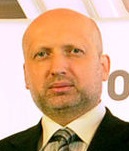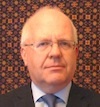By Bob Allen
Instability in Ukraine cast a spotlight on the former Soviet republic’s minority Baptist religious population with the selection of interim president Oleksandr Turchynov, a veteran politician, author and lay preacher at the Word of Life Center in Kiev, which belongs to the Evangelical Baptist Union of Ukraine.
Turchynov, an opposition leader to deposed President Viktor Yanukovych and a one-time member of the youth organization of the Soviet Communist Party, became a Christian in 1998. He has a long record for advocacy of religious freedom, pushing for legislation including the return of church properties seized by the state under Communism and ending import taxes on Bibles brought into the country by religious organizations.
 He is named in a Wikileaks memo about an interfaith dialogue luncheon in 2006, where he disputed a speaker’s assertion that Ukraine needed a national church. “Turchynov, an ordained Baptist minister, stressed that one of Ukraine’s great strengths was its tolerance and diversity; no single denomination dominated society,” the document said. “Turchynov, no friend of the Kremlin, quipped that if the State created a single, national church ‘we’ll wind up looking like Russia or Belarus.’”
He is named in a Wikileaks memo about an interfaith dialogue luncheon in 2006, where he disputed a speaker’s assertion that Ukraine needed a national church. “Turchynov, an ordained Baptist minister, stressed that one of Ukraine’s great strengths was its tolerance and diversity; no single denomination dominated society,” the document said. “Turchynov, no friend of the Kremlin, quipped that if the State created a single, national church ‘we’ll wind up looking like Russia or Belarus.’”
The European Baptist Federation identifies Turchynov as a Baptist elder at the Word of Life Church, created in 1992 in the city of Kiev. Because of his clean-cut image — he doesn’t smoke or drink, for example — and his high-profile Baptist identity, media reports often label him a pastor. He preaches regularly at the church, even though he travels with security.
Over the years Turchynov has met a number of Baptist leaders from organizations such as the European Baptist Federation and the Baptist World Alliance during their visits to the region.
 “I have met him on several occasions, most recently last August with [BWA President] John Upton,” said Tony Peck, general secretary of the European Baptist Federation. “We tried to be supportive to him in the difficult years when he was in opposition.”
“I have met him on several occasions, most recently last August with [BWA President] John Upton,” said Tony Peck, general secretary of the European Baptist Federation. “We tried to be supportive to him in the difficult years when he was in opposition.”
Turchynov’s longtime political ally, Yulia Tymoshenko, a leader of the Orange Revolution of 2004, was jailed in 2011 for abuse of power but dramatically released last weekend after the Ukrainian parliament voted her nemesis out of office Feb. 22.
Baptist World Alliance General Secretary Neville Callam met with Turchynov in 2008, commending the then-deputy prime minister on the level of religious freedom enjoyed in the country.
The election of a Baptist might seem unlikely in a nation with an overwhelming Orthodox Christian religious identity and Protestant population smaller than 1 percent, but observers say Turchynov is well equipped to promote unification and healing in a country sharply divided between citizens seeking closer ties to the European Union and those more in agreement with Russian President Vladimir Putin.
In a 2006 paper for the National Council for Eurasian and East European Research, Pennsylvania State University history professor Catherine Wanner said Ukraine offers far more freedoms to non-traditional and foreign religious organizations than other successor Soviet states like Belarus and Russia.
One result is greater religious diversity and higher levels of religious participation, including a notable increase in the number of Baptist and Pentecostal communities since Ukraine achieved independence in 1991.
With 2,362 churches and 121,645 members, the All-Ukrainian Union of Associations of Evangelical Christians-Baptists is among the largest Protestant groups in Ukraine and one of the largest Baptist bodies in Europe.
Before the USSR collapsed, Wanner said, Soviet Ukraine was home to the second-largest Baptist community in the world, after the United States. “With good reason, Ukraine was called the ‘Bible Belt’ of the former Soviet Union,” she observed.
The history of Baptists in Ukraine dates to the second half of the 19th century, when the rural population in the south began baptizing members following their profession of faith. Over time a community began to emerge, and in 1884 the first Baptist congress was held.
Estimates of the number of Ukrainian Baptists in the late 19th century vary widely, from as few as 100,000 to as many as 300,000, significant numbers during the era of Konstantin Pobyedonostsyev, who cracked down on minority sects including Baptists as chief administrative head of the Russian Orthodox church between 1880 and 1905.
As part of its unofficial policy of state atheism, the Soviet Union adopted a law in 1929 putting high taxes on religious buildings and clergy meant to cripple religious bodies financially and permit the government to confiscate buildings for non-payment. During the 1930s about half of Ukrainian Baptist churches were closed.
It wasn’t until 1990 that the Baptist Union of Ukraine was restored after the Supreme Court finally abandoned the Soviet ideal of establishing a scientific, atheistic worldview by guaranteeing freedom of conscience and a legal status for all religious communities.
Like many Baptists in former Soviet republics, Turchynov holds conservative views on some social issues, such as same-sex marriage. He once responded to a reporter’s comment that his views are more typical of the Ukrainian National Conservative Party by saying: “I do not agree. If a man has normal views, then you label him a conservative, but those who use drugs or promote sodomy, you label them progressive. All of these are perversions.”
Baptist leaders reportedly view Turchynov’s ascendancy as good news but are cautious about commenting publicly on political controversy in a climate where at least 88 people have been killed in clashes between protesters and government forces over the last three months.
‘What Ukraine needs is not just a change of people in authority but a change of the system and the relationship of the authorities to ordinary citizens,” said Pavel Unguryan, international missions department director with the Baptist Union of Ukraine and a member of Parliament. “Ukraine needs love, mercy and forgiveness. Ukraine needs Christ!”
In December the Evangelical Baptist Union of Ukraine called on Christians not to be indifferent to the country’s conflicts and to intensify their prayers for an end to hatred and violence.
“Regardless of the diverse views on political battles, we ask you, brothers and sisters, to join the active thoughts of those citizens who are trying to prevent the destruction of the relations between the government and the people,” Baptist union chairman Vyacheslav Nesteruk said in a statement.
“Remember, a heart that cares for his people [and] does not stand apart from its problems is able to love and conquer this aggression, hatred and arbitrary behavior with love,” Nesteruk said. “We will be careful not to cross the boundary, where anger and hostility replace the principles of the gospel.”
Peck said he is encouraging all Baptists to get behind Turchynov in prayer “for what is a very challenging and critical moment in Ukraine’s history.”
— George Bullard of the North American Baptist Fellowship contributed to this report.
